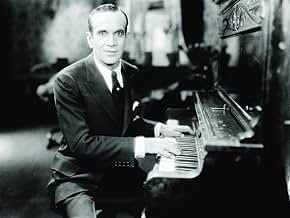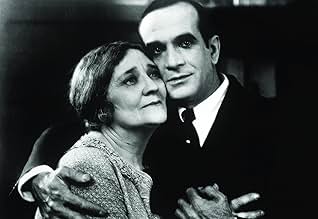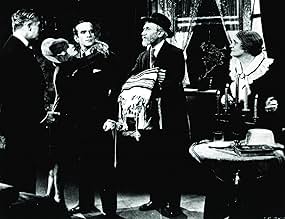Der Sohn eines jüdischen Kantors muss sich den Traditionen seines religiösen Vaters widersetzen, um seinen Traum zu verwirklichen und Jazzsänger zu werden.Der Sohn eines jüdischen Kantors muss sich den Traditionen seines religiösen Vaters widersetzen, um seinen Traum zu verwirklichen und Jazzsänger zu werden.Der Sohn eines jüdischen Kantors muss sich den Traditionen seines religiösen Vaters widersetzen, um seinen Traum zu verwirklichen und Jazzsänger zu werden.
- Für 1 Oscar nominiert
- 3 Gewinne & 1 Nominierung insgesamt
- Jakie Rabinowitz - Age 13
- (as Bobby Gordon)
- Cantor Rosenblatt - Concert Recital
- (as Cantor Joseff Rosenblatt)
- Chorus Girl
- (Nicht genannt)
- Chorus Girl
- (Nicht genannt)
- Small Part
- (Nicht genannt)
- Choreographer - 'April Follies'
- (Nicht genannt)
- Small Part
- (Nicht genannt)
- Violinist
- (Nicht genannt)
- Small Part
- (Nicht genannt)
- Buster Billings
- (Nicht genannt)
- Dance Director
- (Nicht genannt)
Empfohlene Bewertungen
If ever you want to get a real kick see this movie, if you can find a viewable copy, and revel in the historical significance of it. Also take out your copy, or pick up Singing In The Rain, which pays homage to the advent of talking pictures. Although they goof with the characters, such as the voice of Lina Lamont, the very real challenges of transitioning from a silent world to a talkie world is very evident.
The love interest here is so unusual. He does fall in love with a pretty dancer, but tells her plainly that his career is more important than she is. She later doesn't become part of the choice as would be the case in nearly every other script instead she becomes part of the audience, presenting the dramatic quandary: the stage or God.
The presentation of religion is unique in my experience. Everyone here is a Jew, except the performers. They are the "real" and everyone else is "pretend," performing. Though there are many opportunities to fall into obnoxious stereotypes, its avoided over and over. That's despite the dozens of examples they had before.
In fact, there's an amazing engineering of story here. As any viewer will know, this was the first talkie. It was new, and to emphasize its newness a story was created to emphasize the contrast between old and new.
This film is part silent, part "talkie." It shows a struggle between the old (obviously obsolete) and the vital young. It also depicts in a rather subtle but effective way the "old" god, and the new: there's plenty of talk about the performance hall being a modern church. The music as well: we have the implication that it is not only the setting, the performer and the calling, but the music itself that is something new.
Along the way we get street scenes of the Jewish area of New York. These are genuine street scenes and are absolutely phenomenal: there isn't anything I know that compares. There was an attempt of sorts in "The Pawnbroker," which by itself was strong. But nothing compared to this.
Ted's Evaluation -- 4 of 3: Every cineliterate person should experience this.
This is a powerful story with interesting characters and good songs, to boot. It was different to see Warner Oland as somebody else besides Charlie Chan. He played Jolson's father and I never would have recognized him had I not read the credits. Nor would I have recognized William Demarest.
Jolson, however, is the man who dominates the film. Some of this songs wound up being classics, ones played for years and years, such as "Toot, Toot Toosie" and "Mammy."
Faced with a very tough decision on what to do with his life, Jolson's character does the right thing in the end, which was nice to see. Overall, it's entertaining.
Wusstest du schon
- WissenswertesThis is the first feature-length movie with audible dialogue.
- PatzerMary recieves a telegram dated August 8, 1927. Later in the film, Jack is seen writing a letter to Mary, dating it August 7, 1927.
- Zitate
[opening lines, first quote and first words in the first widely-seen talking picture]
Jack Robin: Wait a minute, wait a minute, you ain't heard nothin' yet! Wait a minute, I tell ya! You ain't heard nothin'! You wanna hear "Toot, Toot, Tootsie"? All right, hold on, hold on...
[then he walks back to one of the band members]
Jack Robin: Lou, listen. Play "Toot, Toot, Tootsie", three chorus, you understand. In the third chorus, I whistle. Now give it to 'em hard and heavy, go right ahead.
- VerbindungenEdited into Okay for Sound (1946)
- SoundtracksMy Gal Sal
(1905) (uncredited)
Written by Paul Dresser
Sung by Robert Gordon (dubbed by an unidentified singer)
Top-Auswahl
Details
Box Office
- Budget
- 422.000 $ (geschätzt)
- Laufzeit
- 1 Std. 28 Min.(88 min)
- Farbe
- Seitenverhältnis
- 1.33 : 1






























